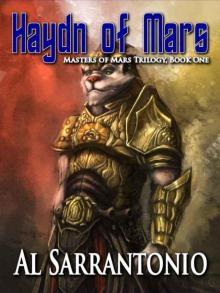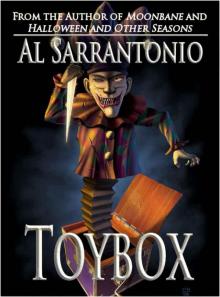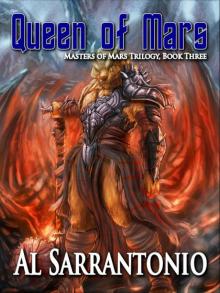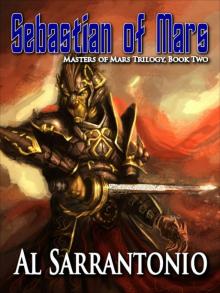- Home
- Al Sarrantonio
Exile Page 2
Exile Read online
Page 2
Chapter 3
In the Senate Chamber of the Grand Assembly of Mars, Senator Cray-Pol was given the floor.
The old parliamentarian shuffled slowly from his seat to the podium. Though his face was wrinkled and his walk lethargic, those who knew the old man understood by the look on his wizened features that he was boiling with anger. The strength of his voice was legendary, as was the depth of his wrath when riled. He had often been compared to a dune snake: sleepy and shade-driven when left alone, but when poked with a stick or dragged into harsh sunlight, all sharp tooth, fiery eye, and poison.
The membership waited for the old man to reach the dais, which he now did with aid. He did not turn in his customary way to thank the Senate page, which in itself gauged his displeasure.
Pushing back the arms of his crimson velvet robe, Cray-Pol gripped the top of the lectern and aimed his fierce stare out at his compatriots. The eyes below his shock of unruly white hair were bottomless with ire.
For a moment he did not speak, the gathering storm taking shape in his ancient body. But when the words finally broke from his lips they were of a force and stentorian level that had not been heard in that deliberative body for decades—since CrayPol himself, as a much younger man, had denounced from this same podium the High Prefect's road-usage tax of 2411.
"This is outrageous!" Cray-Pol shouted into the depths of the pink Senate chamber. For a moment his voice lingered in the high recesses of the domed ceiling, like a bird circling and reluctant to fly away.
From the silence of the gallery came a few mumbled ayes.
"Outrageous, I say! To think that we have been dragged from our supper tables at the whim of one man! That the august body of the Senate of Mars should be treated in this fashion is indefensible! What crisis could possibly warrant such behavior? No one, not the High Prefect himself, warrants the authority to treat this assembly in such a manner. I move that we adjourn at once and that a writ of protest be filed! Whatever this mysterious crisis is, it can wait until morning!"
Cray-Pol pounded on the lectern. Though the strength of his hand in no way matched that of his voice, the murmurs of assent now rose to a clamor from the nearly filled half-circle of seats in the gallery.
With a dismissive wave, Cray-Pol turned from the podium and accepted the help of the Senate page in descending.
Amid a chorus of talking and rustling, the Senate members, remembering their dinners and other activities, rose as one to depart.
"Not yet, gentlemen!" came a voice from the rear of the hail.
Startled, Cray-Pol paused halfway down the final step from the lectern and now, on beholding Prime Cornelian's insect body filling the back doorway of the Senate chamber, indicated to the page that he should be helped back up to the dais.
With a collective sigh, the senators settled back into their seats. One, the incongruously (for a Martian) stout Kol-Fan, produced a ripple of laughter with his lament of, "My roast goose!"
After what seemed an eternity, during which relative silence returned to the chamber, Cray-Pol resumed his spot at the rostrum, pushed back his robe's arms, and gripped the top of the lectern once more. Now, his eyes filling with even greater fury, he shouted, one palsied finger leaving the desktop to point the length of the gallery back at Prime Cornelian.
"How dare you enter this chamber! You are not allowed here! Haven't you caused enough trouble in the last months with your red-shirted ruffians running wild in the streets, your talk of war? You may have fooled some of the Martian people—and even the High Prefect—with your phony nationalism and your call to the old, warlike heritage of Mars, Cornelian, but you haven't fooled me!"
Cray-Pol's words echoed and faded. Absolute silence descended on the Senate chamber. A few heads swiveled to regard Prime Cornelian, who stood unmoving in the open doorway.
"Sentinels!" Cray-Pol shouted. "Remove that thing!"
Before the two festooned guards at the sides of the chamber could react, Prime Cornelian, in a voice even stronger than Cray-Pol's, said, "I bring you sad news . . . of the death of the High Prefect."
A collective gasp rode through the gallery.
"No!" Kol-Fan, settling weakly into his chair, whispered, all thoughts of dinner gone.
"We must stay in session until a new High Prefect is chosen!" came a voice from one side.
"Where is Senator Kris?" came another. "Let us elect him new High Prefect!"
At the podium, Cray-Pol seemed stunned, unable to speak or move.
"May I speak?" Prime Cornelian said courteously. When Cray-Pol still made no move, a voice cried out, "Let him speak!" seconded by, "Yes!"
Cray-Pol, at a loss for words, mumbled, "This is highly unusual. . . ."
"Give Cornelian the podium!"
In the back, Prime Cornelian waited patiently. Cray-Pol, mustering his strength, said, "We must put this to a vote. All those in favor . . ."
Nearly every hand, save for Cray-Pol's and that of L(ol-Fan, who had fainted, shot into the air. "Very ... well . . ." Cray-Pol said.
The old man turned away, leaning heavily on the page, and was helped down from the dais.
An electricity of anticipation built as Cray-Pol was helped to his seat and was lowered, shaking, into it.
Only after the old senator was seated did Prime Cornelian make his way up the center aisle. He seemed oblivious to the fact that those senators seated on the center aisle shrunk away from his form as it passed. His six insectlike limbs climbed the platform in a fluid motion and he turned to regard the assembly with his slitted eyes.
He spread his front hands in mock sadness, tilting his head to one side.
"He did not die in his sleep," Prime Cornelian said with a sigh, "nor peacefully."
He made a flicking motion with one needlelike finger.
Instantly a detachment of Martian Marines filed in through the rear doors, spreading like red ink around the perimeter of the chamber.
"Sorry about the, ah, security," Prime Cornelian said mildly, "but one can never be too careful."
In his seat, Cray-Pol began to recover and sat regathering his wrath.
Marines continued to file in, completely ringing the chamber. Now with another flick of Prime Cornelian's finger the heavy rear doors of the chamber were slammed shut with a hollow sound.
"I could say you are a captive audience—but we'll dispense with the levity," Prime Cornelian said. "The bald truth is, the High Prefect was murdered, by myself. As was General Korvin. They were both unreasonable men and refused to believe in the coming crisis. General Korvin, whose underlings seem more inclined to my views, has been replaced by . . . myself, and the High Prefect has been replaced by .. ." here he turned a sharp metal fingertip to point at his chest, "myself."
An uproar welled through the chamber. It was quickly silenced by the raising of two hundred Marine raser rifles.
Prime Cornelian held up his hand for silence—which nearly ensued, until Cray-Pol, his face a deep shade of angry red, pushed himself, shaking, to his feet.
"If Kris were here you would dare not—"
With a sigh Prime Cornelian said, "Kris is not here. In fact, aside from the few of you miserable lizards in this room who are still his friends, I have already eliminated any of his allies I could find, in the military, in the cabinet, hiding behind chairs—wherever I could find them." He made a motion to one of the Marines, who sighted his raser and fired. A ruby line pierced the old senator's upper body.
With a shocked gasp, the wrath, and life, left Cray-Pol's body. He collapsed into his chair, a knuckle-sized blackened hole showing completely through his chest cavity.
Tomblike silence descended on the chamber.
"And now," Prime Cornelian said, "I'm afraid that I must insist that the Senate be dissolved. All in favor?"
Prime Cornelian help up a hand, glaring at the assembly.
All hands in the gallery, save that of Kol-Fan, still mercifully unconscious, rose trembling into the air.
One brave voi
ce, that of the young Senator FelPen, called out, "What crisis do you speak of, Cornelian?"
Prime Cornelian waved a digit in dismissal. "It's no concern of yours. After all, you won't be around to be bothered by it."
"But," a frightened voice called out, mixing with others voicing similar pleas, "we are dissolved!"
Prime Cornelian gave indication to the ring of Marines, who now sighted their weapons as one, training them on the mass of senators, caught like fish in a barrel.
"You can't do this!" one voice cried.
"We'll go quietly!"
"We're dissolved!"
"We will side with you."
"We hate Kris!"
"Did I say dissolved?" Prime Cornelian smiled. "I meant . . . liquidated. You're much too dangerous as a deliberative body. The people will follow me much more readily if you aren't around to interfere."
His jointed limbs carried him smoothly from the platform to the aisle, toward the back of the chamber. As he passed, those senators on the aisle seats who had shrunk back from his passage now reached out to grab at his body.
"Don't do this!"
"The people of Mars will never let you get away with this!"
"We have wives and children!"
"Kris will stop you!"
"We'll help you!"
Prime Cornelian pushed past them. In the midst of a phalanx of Marines, he strode through the chamber doors, which opened ponderously on their ancient hinges.
As the two Marines manning the doors began to swing them shut, Prime Cornelian stayed them.
"Leave them open a little," he said. Onto his insect's face came something resembling a smile. "I want to hear the . . . deliberations inside."
There was a clamor of voices from within the chamber, protestations drowning out beggings. Then one high whine sounded as a single raser began to fire. It was immediately joined by a multitude of others until a sound resembling a high-pitched organ chord drowned out the screams of the senators.
Soon there was only the sound of the raser rifles. Then silence.
Prime Cornelian sighed.
"Such a waste," he said, moving off with clickings of his machine limbs. "I always liked that chamber. Now it will have to be cleaned before it can be used again."
Filled with a sudden thought, Prime Cornelian stopped, turned, and returned to the doors.
"Open them," he snapped.
The rigid Marines obeyed immediately, swinging the doors back to reveal the carnage within. Already, the great majority of the soldiers were stacking the dead corpses in one corner of the giant hall; Prime Cornelian noticed the incongruously rotund body of Kol-Fan on top of one pile, and was mildly annoyed that the fat senator, who was such an anomaly among the generally lean Martians, had never regained consciousness to feel the raser fire burning through him.
Prime Cornelian made his way to the front of the chamber, mounted the steps to the dais once more, and looked out over the assembled, sightless dead.
"It occurs to me," he said, noting with pleasure that his Marines did not dare to pause in the work, but continued on obediently, "that I did not give the Senate the courtesy of answering Fel-Pen's question: namely, what crisis has prompted me to do this. That is an easy enough question to answer.
"The answer is this: We are going to war!"
Chapter 4
Alone in his room, brooding like only a young man in love can brood, Dalin Shar heard a second knock at his door.
He ignored it, as he had the first. He knew who it was, and he did not feel like speaking to Prime Minister Faulkner at the moment. In fact, he did not feel like speaking to the prime minister ever again—or anyone else, for that matter.
The knock came again, more insistent.
"Go away, Faulkner! If there's any business to be taken care of, take care of it yourself!"
"But Sire, I must speak with you!"
"I said leave me alone!"
"This is a matter of the utmost importance!"
"What is it—cotton? Has the price fallen again? Or is it the wheat lobby in the West, clamoring for more favor? Are the North American nomads threatening colonies with their plagues, as they did two years ago?"
"Sire, I must insist!"
"Leave me alone!"
"It concerns the Martian delegation!"
Instantly, Dalin's interest was piqued. -
"What of it?" he shouted, through the still-closed door.
"Sire, open this door at once!"
Now Dalin's interest was further heightened by the note of anger in the minister's voice—a rare, actually unknown, element. Dalin Shar rose to let Faulkner in.
The prime minister bowed from the waist on confronting Dalin face-to-face.
With impatience, Dalin snapped, "Come in and tell me what you know."
Faulkner straightened to his height of six-foot-five, smoothed his immaculately pressed tunic, and followed Dalin stiffly into the room. He stood while the king threw himself facedown onto the bed.
"Speak," Dalin Shar said morosely. "Tell me what you know of Tabrel Kris and her father." He sighed. "Forget her father—tell me what you know of Tabrel."
In measured, serious voice, Minister Faulkner said, "Very little, in fact, Sire. The senator and his daughter are on their way back to face a crisis on Mars. Their shuttle engaged its phase drive soon after passing beyond our Outer Defense Shield."
Idly, Dalin said, "Did you check to see if they stole any silverware, Minister?"
Confusion washed across Faulkner's face, and then he said, "That was a joke, Sire?"
"Yes, it was." Dalin sighed. "Tell me what you know of Tabrel Kris."
Faulkner said, "There are more important things to discuss. It seems we have a crisis here on Earth, too." The minister turned to the far wall and gave a command. Instantly its paintings melted away into a depthless Screen.
"Forty-four, twenty," Faulkner said, and the deep black filled in with an aerial, three-dimensional view of a blackened section of Earth.
Dalin did not look at the wall, but kicked his legs languidly against the bed, his chin resting on his fists.
"Sire, please," Faulkner said.
"Oh, all right," the King said, sitting up to face the screen. "If it will make you leave any faster."
"What you see—" Faulkner began to lecture.
"What I see is part of the Americas," Dalin Shar said, utilizing a bored, singsong voice. "If my dreadful geography lessons serve me, it is the main portion of the Lost Lands, stretching from what used to be the middle Atlantic States of the United States of America down through the Amazon Basin. It is an area nearly devoid of ecological activity. The acid content of the rainfall in the area is . . ."
Dalin's rote memory failed, and Minister Faulkner immediately spoke up:
"Thirty point nine, by the Rhemer scale, deadly to most plant and animal life. The area is inhabited by cockroaches and mutant mammal life . . ."
Faulkner's voice trailed off as he noticed that the king had abandoned his viewing of the screen and once more lay on the bed, this time on his back. He stared at the ceiling.
"Sire?"
Dalin Shar yawned. "What is it, Minister Faulkner?"
"Please bear with me!"
Blowing his breath out, Dalin dragged himself up to a sitting position once more.
"Is there a point to all this, Faulkner? I've seen these pictures a thousand times, as well as the blackened areas of Europe, the Lost Lands in Australia and lower Africa. I know all the facts about mineral depletion and natural resource scarcity. I know that Afrasia is all we have left on what used to be blue little Earth, and I know that outside of cotton and a few other commodities that won't grow anywhere else, we have very little that the rest of the Four Worlds wants or needs. I know about our little colonies on Earth, and our two colonies on the Moon. I know all the geography, meteorology, climatology, agronomy, and, for that matter, literature, music, history, languages, cultural differences, tact, diplomacy, and games theory that I will e
ver need or ever want to know. So what, Minister Faulkner, is the point of all this?"
Prime Minister Faulkner's eyes hardened for a moment—this was another reaction that Dalin Shar had never noticed in the man before. The look seemed to say, Stupid boy, and it was not one that Dalin relished. Instantly his own manner changed, from peevish young pup into inheritor of the throne of Sarat Shar, First King of Afrasia and Ruler of Earth.
"Get to the point, Prime Minister."
Faulkner himself obviously noted the change in the air, and immediately became more conciliatory. He turned and indicated an area along the coast of the Gulf of Mexico, where a fringe of green made a stark contrast to the bleak brown and black areas inland.
"As you know, Sire," he said, "this perimeter of land was reinhabited twenty years ago by a group of colonists sponsored by your father. The colony is called New Texas, even though the strip of land touches on what used to be parts of the United States, stretching to Georgia, all the way around the gulf into former Mexico." To the screen, Faulkner commanded, "Zoom."
The picture widened, so that the strip of green curled around the perimeter of the screen.
"Zoom again."
The screen was filled with green, the lushness of trees and greenery of which not even much of Afrasia could boast. And in cleared-out areas, one large one in particular, stood clearings dotted with man-made structures, in the Indo style of the twenty-fourth century, when the Indian peninsula had been the seat of Earth's government before much of it, too, succumbed to ecological ruin and became Lost Lands.
"It is here," Faulkner said, "in a town called Sarat, ironically named after your father, that a rebellion has broken out."
"A rebellion?" Dalin Shar said, his eyes widening. The minister did not turn around, but nodded curtly.
"Yes, Sire. And I have reason to believe that it has already spread to the other colonies along the American coast, and even into the Far Colonies in the Pacific."
"What kind of rebellion, Prime Minister?" Dalin said, still not sure of what he was hearing. "What could these people possibly want?"

 Five World Saga 01 Hornets and Others
Five World Saga 01 Hornets and Others Cold Night (Jack Paine Mysteries)
Cold Night (Jack Paine Mysteries) Haydn of Mars
Haydn of Mars Toybox
Toybox Queen of Mars - Book III in the Masters of Mars Trilogy
Queen of Mars - Book III in the Masters of Mars Trilogy Exile
Exile Summer Cool - A Jack Paine Mystery (Jack Paine Mysteries)
Summer Cool - A Jack Paine Mystery (Jack Paine Mysteries) Return - Book III of the Five Worlds Trilogy
Return - Book III of the Five Worlds Trilogy The Orangefield Cycle Omnibus
The Orangefield Cycle Omnibus Summer Cool jp-2
Summer Cool jp-2 The Boy With Penny Eyes
The Boy With Penny Eyes Journey - Book II of the Five Worlds Trilogy
Journey - Book II of the Five Worlds Trilogy Kitt Peak
Kitt Peak Campbell Wood
Campbell Wood 999
999 October
October Sebastian of Mars
Sebastian of Mars Moonbane
Moonbane Totentanz
Totentanz House Haunted
House Haunted Halloweenland
Halloweenland Hornets and Others
Hornets and Others